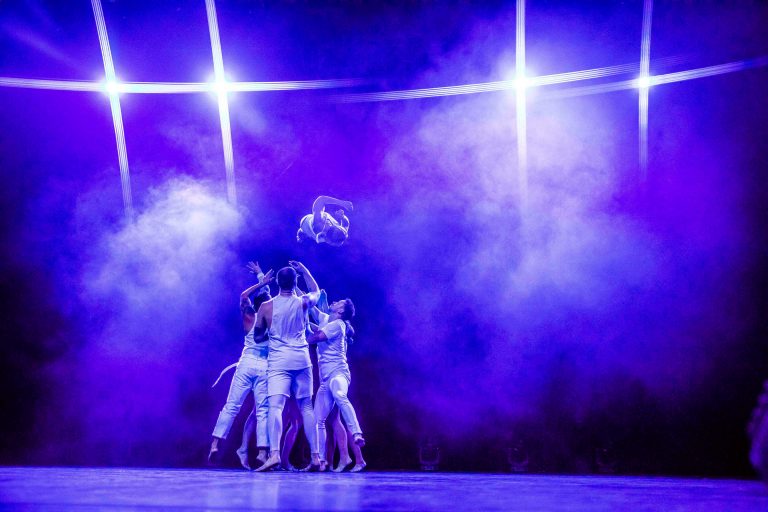Name: Šejla Softić
Since 10 years: Entrepreneur, Artist, Teacher, Dancer, Choreographer, Dance Educationalist
Recipe for success: know your community
Biggest motivation: people who count on you
Personal life motto: be consistent & write ideas down
Meeting the Artist
Colorful, homey, inspiring – those three words flash through your mind when entering arriOla association dance studios in the heart of the Viennese artsy scene, or any other of their franchised dance studios all around Austria. Advocate of this atmosphere is the person sitting behind the counter, or rather the bun that I see when approaching the front desk. The person behind the bun looks up, smiles with the brightest grin I’ve seen in months, takes off her black headphones and greets me like she knows me.
This is Šejla Softić, an artist through and through. Notorious choreographer, respected teacher, dancer, performer, artist and above all, human being at heart. Her choreographies have filled arenas at the Dance Star World Finals’ Gala Night, Stadthalle Wien, and Dschungel at MQ. How did she get there?
Meeting the Demand
During her English & Psychology studies, Šejla wanted to do something useful and impactful – she joined arriOla association dance studios as Manager and Chairwoman and has been a part of writing Austrian dance history ever since. Together with Rebekka Rom, who is the Founder of arriOla association dance studios, she followed the scene’s wishes and demands: They first started out by giving dance classes, then raised dance educationalists (Tanzpädagogen), opened Austria’s very first dance-kindergarden (riOriO), founded various artists & talent agencies and established successful competition teams for the World Dance Finals in Poreč – the scene liked it, arriOla adapted to the dancers’ needs, and word of mouth did the rest.
Leading From the Heart
A decade later, Šejla can look back at being the driving mind and force behind establishing a professional dance education in Austria, managing arriOla into a franchise business, and growing the community from the bottom of her heart. “You have to be willing to go beyond regular work hours if you want to succeed and if you want to do as much as I have been doing”, Šejla concludes. How did she build a dance studio almost from scratch? “Everything was learning by doing. Not having guidance made me make mistakes I could learn from and grow.”
Šejla never left the teaching side in order to know what’s needed and to connect with the community on a personal level. Consistency, excellent customer service, and a team with the same values that supports each other helped her grow arriOla into its current size. Her secret formula: “Let people be who they are and stay up to date with the latest trends. The rest will follow.”
Writing Dance History
“Dancing has been my hobby, and suddenly it became my job. Then it became a job that you can offer to other people. Then it grew into something that you can actually commercialize.” After a decade, Šejla realized she’s actually been working all along, despite people telling her to get a real job. “The dance scene in Austria is so small that what we do is still not considered a real job.” They don’t have unions nor special contracts, for instance, unlike other industries where those frameworks exist and don’t need to be built up from scratch. Nonetheless, people love the movement and dancers/artists benefit from it. Every year, five to ten dance educationalists graduate from the KKTP (Kolleg für kommerzielle Tanzstile und –pädagogik) Program laying more ground for the whole industry to grow.
Additionally, Šejla offered seminars for Musik Uni Wien, Pädagogische Hochschule Krems et al. on integrating dance into the school curriculum. “Dancing is actually part of the school curriculum. A lot of teachers wanted to learn how to move with their children in the classroom.”
The best part of her vocation: “We are still writing dance history. Someone even stated in a press conference recently that Sport clubs (Vereine) in Austria are considered a cultural treasure. Being able to be a part of creating that history for Austria – and the whole scene is contributing – that’s just the most amazing thing.”
Surviving Existential Crisis
Most dancers/artists are self-employed, so the Corona wave brought a whole existential crisis upon the scene. Šejla had to watch her fellow artists struggle with paying rent the coming month or having false messages circulating in the media. What do you do when your bread and butter comes from working with the community? “Main thing I’ve acquired is listening to myself, to my body and to my mind, and just accepting the way you feel today. Taking it one day at a time.”
It was unclear how long the studios will be closed, as dance studios legally differ from fitness centers and also from the classic Viennese dance schools for ballroom dance. While waiting and writing an open letter for governmental instructions, virtual classes have become the new norm. ArriOla was offering online classes for free because they wanted to be there for their community. People who have already paid for the Semester-pass, could ask for a voucher for the following semester, for their money back or also donate the money. Despite the pandemic, the association still had to cover monthly costs. “We are aware that our community is strong. How strong we’ve realized during this crisis. Almost nobody asked for their money back. It was a small miracle. They supported us as much as they could, and still do. In times like these, people appreciate what they have.”
#VieDance #VieCare #VieShare
Dancing is nurtured by the community and things move fast in small communities. “You can’t be a solo artist in the dance industry all the time, it’s just not right for that. Connecting with other studios is something everybody benefits from. So, together with other Viennese dance studios, we started this movement #VieDance #VieCare #VieShare of supporting our dance community psychologically and physically during Covid-19.”
With everything being out in the open on Instagram (and TikTok), the choice of dance classes became endless: “Everything in the world is going more local; the dance scene, however, has become more global with access to teachers worldwide through online classes.”
An artist – To be, or not to be
The big question mark remains. With the repercussions of the pandemic, should young fellows still follow their dream of being an artist? “Get a back-up plan and be very patient. Try to earn some money on the side. Being an artist is about contributing to the community and giving something of yourself, expressing yourself. It’s not necessarily only about making money. If you don’t have that willingness, then you shouldn’t become an artist. Because that’s what being an artist is about.”
In a world where online giants have become the main platforms for artists, how do you generate followers when any artist worldwide is at your fingertips; how do you attract an audience as a newbie? “You have to be realistic. Nowadays, you need to understand economics, be able to work with a smartphone, computer, other artists, and use Instagram as your main platform to reach people. You need to find out what you want to do, what makes you unique. If you want to get started, you just have to do it. In order to do it, you have to formulate what you want to do and writing down ideas has always helped me. Whether it’s vision boards, diaries, to-do lists, calendar entries, recordings – whatever feels good for you. As an artist, just write down and document everything.”
Artists Post-Corona?
The yearn for culture has peaked during Corona. While shows and performances have been cancelled, confinement has surged – ironically – a cultural desire of the masses. “People have now realized that we are all in the same boat, we all have the same problems, and we all share the same passion. I think this could be a chance for Austria to integrate the dance scene a little bit more into the whole cultural sector. Artists are needed. They will always be needed. But in times of crisis, they are the first ones you don’t want to pay any longer.”
Next week: Annemarie Harant & Bettina Steinbrugger, Erdbeerwoche
In our weekly interview series, we will be featuring various inspirational entrepreneurs of the Austrian startup scene. Each Monday, you can expect useful insights into their lives and practical tips that you can follow in order to walk your entrepreneurial path. Like, share, comment – and feel free to reach out to us. Suggestions, ideas, remarks are all welcome – let’s shape the ecosystem together.






